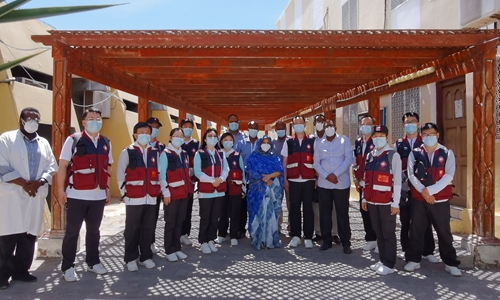Chinese medical expert decorated by Djibouti for COVID-19 prevention
By Li Qiao Source:Global Times Published: 2020/5/28 18:58:41

The Chinese medical team takes a photo with local doctors in Djibouti in May. Photo: Courtesy of West China Hospital of Sichuan University
Zeng Yong, the leader of the Chinese medical team assisting the fight against COVID-19 in Ethiopia and Djibouti, was awarded for "Independence Day Medal for Officers" by Djibouti Prime Minister Abdoulkader Kamil Mohamed on May 10. Zeng told the Global Times that China's experience cannot be totally replicated in Africa and Chinese experts offer solutions tailored to local conditions.
"If there is a need, I can go abroad for assistance at any time," Zeng said.
Zeng , 58, a vice president of West China Hospital of Sichuan University, was responsible for anti-epidemic efforts in his hospital before assisting Africa. At the invitation of the Ethiopian government, Zeng was appointed to lead the team on April 16, along with 11 other medical experts from Sichuan Province, bringing medical treatment supplies donated by the Chinese government to support Ethiopia and Djibouti.
Other team members, who returned to China by a chartered plane on May 12, were awarded the "Independence Day Medal for Knights" by Djibouti.
Zeng said Western reports against China have influenced public discourse throughout Africa, but Chinese experts' professionalism and sincerity earned the respect of the communities they served.

Zeng Yong Photo: Courtesy of Zeng Yong
Chinese solutions
Zeng and his team members were surprised about the awards as they were not told in advance.
"I'm so proud that our work was highly admitted and praised by Djibouti. This medal shows the friendship between China and African countries," Zeng said. Djibouti attached great importance to the suggestions of Chinese experts, who even postponed their planned date of return on May 8.
Zeng told Djibouti public health officials 10 percent of the COVID-19 patients would be tested positive again after recovery. Chinese experts suggested Djibouti to follow up with discharged patients and test them again to prevent possible community infection.
Both Ethiopia and Djibouti use anti-malaria chloroquine and antibiotic azithromycin to treat COVID-19 patients. China also uses them, but is wary of chloroquine for fear of side effects.
African countries have the experience of fighting malaria, and the side effects of the drugs do not seem to be significant. Because there are no specific drugs for the treatment of COVID-19, Chinese experts respected local medication habits and did not exclusively recommend the medicine used in China, Zeng noted.
Ethiopia learned from China how to build Fangcang makeshift hospitals for COVID-19 patients, providing at most 1,000 beds.
Zeng visited the hospital during its construction and found they had built an ICU in the makeshift hospital.
"It was relatively unpractical to introduce that as Chinese Fangcang hospitals are only for mild patients," Zeng said.
Zeng found the ventilation of ICU was insufficient, posing the risk of cross infections, and suggested to change the location of ICU.
Mandating masks is one of China's national measurements to prevent the spread of the virus. However, Ethiopia is one of the poorest countries in the world with a weak industrial base.
"Because of poverty and shortages of commodity, it was unrealistic to call for locals to wear masks," Zeng said.
Chinese experts suggested locals make masks with cloth by themselves, and encouraged local women to cover mouth and nose with their shawls.
"African people realized that we came to provide practical solutions according to their circumstance, rather than throwing impractical methods without thinking directly," Zeng stressed. "So they appreciated and respected our assistance very much."
Zeng said based on his frontline experience he believes there will not be a large-scale COVID-19 outbreak in Africa.
Most of COVID-19 patients in Africa are mild and asymptomatic. Zeng said it may be because many African countries have younger populations.
The average age of more than 500 COVID-19 patients in Sichuan Province is about 57, and the median age of patients in Africa is about 30, Zeng explained.
Africa's high temperatures are not conducive to the spread and survival of the virus, Zeng noted. Djibouti is very hot and humid, and Addis Ababa, the Ethiopian capital, is located on a plateau at an altitude of 2,400 meters. This natural environment is hostile to the replication and transmission of the virus.
"Africa has a long history of fighting infectious diseases, having accumulated extensive experience. Many African medical experts in Europe and the US have also returned to Africa to make top-level designs of public health," he explained, adding that "African countries can improve the implementation."
Mutual respect
Doctors often worked in high temperatures up to 40 C. "We wore protective clothing and were sweating profusely in the ward within half an hour," Zeng said. He respected that local doctors specializing in treating infectious diseases suffer in such hot weather.
To abide by local customs, Chinese experts did not eat or drink until 4 pm on the Eid al-Fitr festival. "The conditions were tough, but we want to show respect to local Muslim staff," Zeng noted.
To relieve the pressure, Zeng and other Chinese experts played table tennis and billiards after work.
One local medical expert asked Zeng whether the virus originated from China. And some locals were influenced by some Western media hyping allegations of discrimination against Africans in South China's Guangdong Province.
"Western voices have influenced African public opinion, but Chinese voices are not widely heard," he said. But Zeng is proud that their work has earned respect from African authorities and local people.
In Africa, Zeng missed and worried about his daughter who suffered from sudden deafness in the end of March. "I'm worried she is putting too much pressure on herself for the high school entrance exam in July," Zeng said.
Newspaper headline: Solutions with solidarity
RELATED ARTICLES:
Posted in: PROFILE